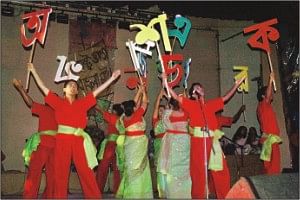“Bhashar Larai”: A chronological look at the struggle for language

A scene from Bhashar Larai performed by artistes of KanthoshilonPhoto: STAR
The Bengalis' struggle for the right to speak the mother language in Pakistan is widely known. However, going back in time, few are acquainted with the movements for language and freedom by the people of this land in the ancient times.
Rafiqur Rashid's poem titled Bhashar Larai features a chronological look at the struggles of Bengalis for their language. According to Rashid's poem the people of this land had to fight to ensure their right to speak the language since its inception.
Artistes of the recitation troupe Kanthoshilon presented Rashid's Bhashar Larai through abritti-pala (a combination of recitation, choreography and music). The abritti-pala was staged on December 11 at the Shawkat Osman Memorial Auditorium, Central Public Library.
The narrative begins from the ancient Pala dynasty (8th to 12th century) and ends in the contemporary times. Apart from the struggle for language, the aesthetic aspects of Bangla literature in different ages as well as the nation's urge for freedom have been portrayed in Rashid's poem. Rashid has also used refrains from works by legendary poets from the different ages.
As part of the chronological survey, Rashid focuses on the struggle of the poets who wrote the Charjapad -- an antique manuscript found in Nepal, featuring Buddhist verses which are considered to be the oldest record of Bangla. Rashid has even used a Charja in his poem that describes the rural lifestyle in those days.
The Sen dynasty, the successor of Pala, banned Bangla and claimed that those who practiced Bangla would go to hell.
Bangla speakers enjoyed some freedom in the medieval period. Which is why, according to Rashid's Bhashar Larai, we have records of rich literature from this period such as Sri Krishna Kirtan. During the initial stages of the Turkish invasion, Bangla received patronage from the ruling class. Works of poets like Alaol bear the evidence.
Again Bengalis had to struggle for the language during the colonial period, which received a momentum in the Pakistani period.
The Language Movement of 1952 plays an important role in Rashid's Bhashar Larai. The role of leaders, attitude of the rulers and the struggle of the Bengalis in 1950s were presented aptly through recitation by the artistes of Kanthoshilon.
Bangla literature had to overcome major hurdles, when the Pakistani regime banned Tagore and tried to impose Urdu culture and literature in the 1960s. The depiction of the movements in the '60s was the highlight of the performance.
The struggle for language initiated a gradual movement for independence. Rashid's poem ends with the nature of struggle for the language in the contemporary period.
The show was directed by Meer Barkat.
At a discussion prior to the performance, poet Rafiqur Rashid, theater personality Nasiruddin Yousuff and cultural exponent Sanjida Khatun delivered speeches. The show was inaugurated by Sanjida Khatun.

 For all latest news, follow The Daily Star's Google News channel.
For all latest news, follow The Daily Star's Google News channel. 




Comments